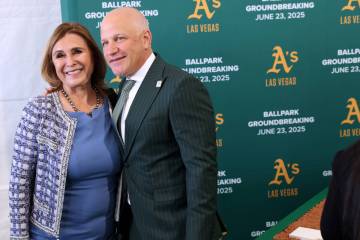Blame system, not Calipari, for rash of one-and-dones
NEW ORLEANS -- The argument will take center court tonight, college basketball's premier program of the one-and-done model playing for a national championship most believe it will win with players most believe are more interested in their future NBA homes than the university name stitched across their jerseys.
John Calipari says it isn't his rule, isn't his players' rule, isn't a rule he favors or controls. But it has delivered him and Kentucky to this moment, where the question of whether stockpiling new talent each year instead of fostering the same names over a period of time will prove to be the winning formula in the sport's biggest game.
The two winningest programs in history meet when Kentucky and Kansas play for a championship at the Superdome, where Calipari will start three freshmen whose most important task following tonight might be selecting what suit to wear come the NBA Draft in June.
"I don't apologize for it," Calipari said. "North Carolina just lost three underclassmen. Duke is losing them. Steve Jobs left (college). Bill Gates left. The integrity of their schools were at stake when they left? They should have stayed and not changed the world? At the end of the day, I don't apologize for anything we do."
He shouldn't when it comes to recruiting a one-and-done player, and nobody does it better.
The 2006 NBA Draft was the first that required a player to be 19 years old and a year removed from high school, a rule that lacks both wisdom and reason. That year, two one-and-dones were selected in Tyrus Thomas and Shawne Williams. Yeah. Hardly perennial All-Stars.
Since then, 38 more one-and-dones have departed school. Of those, eight played for Calipari, both at Memphis and Kentucky. He will add to that list after tonight, when freshmen Anthony Davis, Michael Kidd-Gilchrist and Marquis Teague are expected to play the final college game of their only college season.
"(Calipari) is the best salesman our sport knows," Kansas coach Bill Self said. "He recruits good players but he coaches good players. He gets them to buy in. He's going to get guys. Nobody has recruited like him, and nobody has coached better considering how many young kids he has and how he gets them to play for one purpose.
"You go out and get the best players, period. I think he runs things like you would an NBA team. It's an NBA environment in college. That's smart. That's what he should be doing. And, yes, I'd sacrifice if I had to coach Davis and Kidd-Gilchrist for a year or two, which would be a terrible problem to have."
Self was joking, of course, but none of it changes this: The one-and-done rule is ridiculous. It not only prohibits a kid from earning a living out of high school but makes a mockery of a system of higher learning and its intended mission. Most one-and-dones have little interest in attending college, but are forced to with no intention of earning a degree.
It's not healthy for anyone.
Calipari has outlined his solution to keeping players longer than one year, a plan that would include allowing for disability insurance loans against injury, shaving years off NBA rookie contracts for remaining in school and an increase in professional pay for graduating college.
I'm not sure any of it will ever fly with the NCAA or NBA, so Calipari annually wins big with short-term solutions. In three years at Kentucky, he has started freshmen 54 percent of the time and won 88 percent of his games.
Kansas will be led in large part tonight by guys who sat on the bench early in their careers and waited their turn, players such as juniors Thomas Robinson, Elijah Johnson and Jeff Withey.
At Kentucky, new guys never sit.
You can question Calipari for having two Final Four appearances vacated when one star player (Marcus Camby) took money from an agent and another (Derrick Rose) had his SAT score invalidated, for how his Kentucky team owns the Southeastern Conference's highest Academic Progress Rate with this many one-and-dones in a league that includes Vanderbilt, for what academic or other corners might be cut and deals made at a university that pays a coach in the neighborhood of $5 million a year to win basketball games.
But when it comes to recruiting one-and-dones, Calipari is merely proving himself the best at taking advantage of a shameful situation that has negatively altered the college game.
"When recruiting, we don't promise people of how often they'll start, how many shots they'll get," Calipari said. "It's hard to come play here. It's not for everybody. Every game we play is someone's Super Bowl. You're not playing in front of an empty seat all year. There is no place to hide, no crack to go down into. It's not for everybody.
"Kids have to trust what we're saying because there's not a lot of time for back and forth. I don't like the (one-and-done) rule. But I'm not here for a popularity contest."
The one-and-done king and his collection of stars puts the argument to the test tonight on the sport's biggest stage. A win by Kentucky could validate the rule in some minds.
But it won't hide this truth: College basketball is worse for it.
Las Vegas Review-Journal sports columnist Ed Graney can be reached at egraney@reviewjournal.com or 702-383-4618. He can be heard from noon to 3 p.m. Monday through Friday on "Gridlock," ESPN Radio 1100 and 98.9 FM. Follow him on Twitter: @edgraney.
KENTUCKY VS. KANSAS
■ WHEN: 6 p.m. today
■ WHERE: Mercedes-Benz Superdome, New Orleans
■ TV/RADIO: CBS (8), KWWN (1100 AM, 98.9 FM)
■ RECORDS: Kentucky 37-2, Kansas 32-6
■ LINE: Kentucky -6; total 137 1/2

















